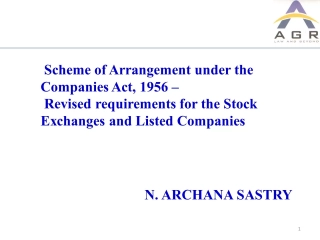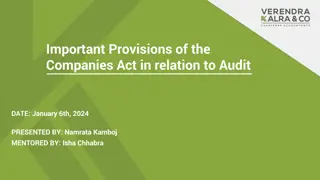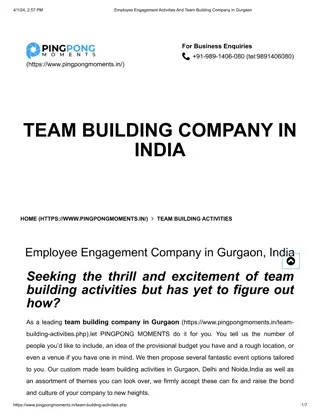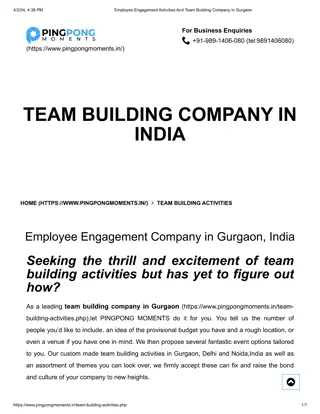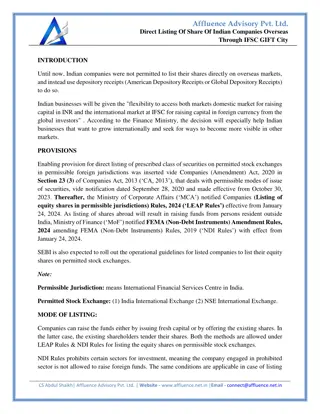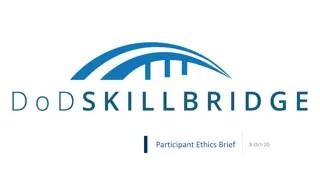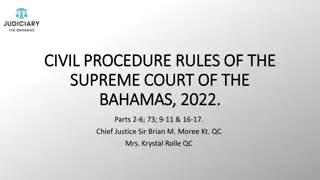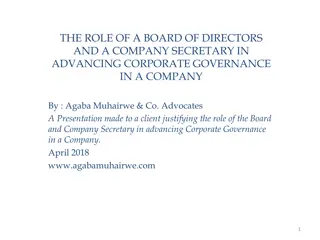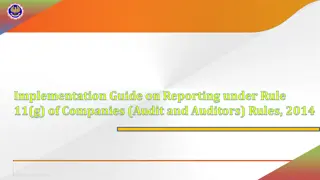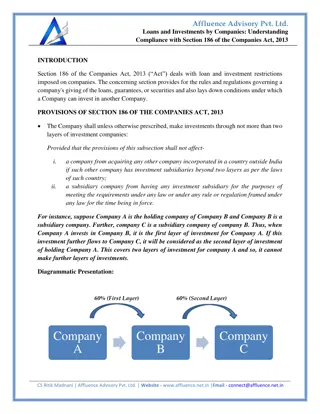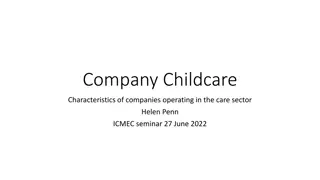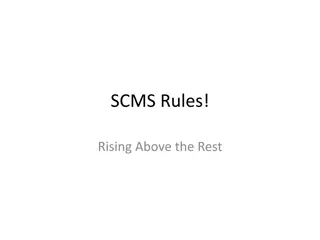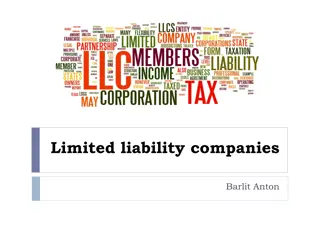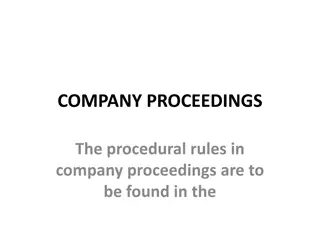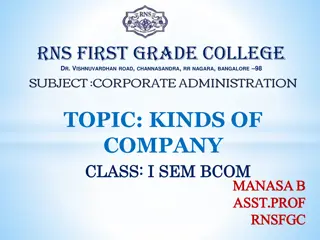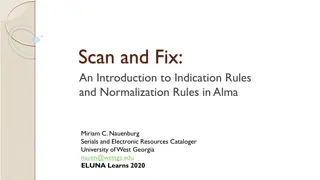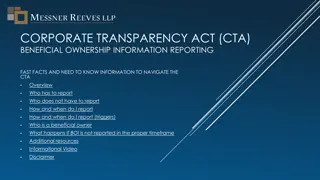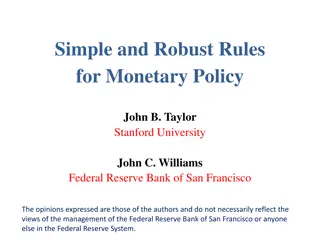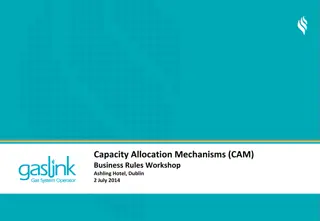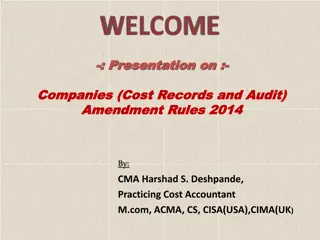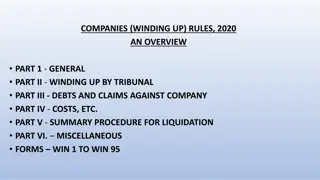Scheme of Arrangement under the Companies Act, 1956
The changes introduced in the existing procedures for stock exchanges and listed companies regarding the scheme of arrangement under the Companies Act, 1956. It covers the submission of draft schemes, display on websites, changes in internal procedures, court process, approval of shareholders, and i
4 views • 16 slides
Important Provisions of Companies Act Regarding Audit
The Companies Act mandates specific provisions related to audit, including the appointment of auditors, consent, certificates, and rotation requirements. Companies need to appoint auditors timely, obtain consent and eligibility certificates before appointment, and adhere to mandatory auditor rotatio
2 views • 22 slides
Team Building Companies In Gurgaon
Discover top-rated team building companies in Gurgaon, specializing in innovative workshops and activities designed to enhance teamwork, communication, and morale among employees. From engaging outdoor adventures to dynamic indoor exercises, these companies offer tailored solutions to foster a colla
3 views • 7 slides
Team building companies near me
Looking to foster unity and enhance productivity within your organization? Explore team-building companies near you to cultivate a cohesive workforce. With tailored activities and expert facilitation, these companies specialize in strengthening bonds, improving communication, and fostering collabora
0 views • 7 slides
Blog 2- Unveiling the Top RPO Companies in the USA_ Elevate Your Recruitment Strategy
In the competitive landscape of talent acquisition, companies are increasingly turning to Recruitment Process Outsourcing (RPO) providers to streamline their hiring processes and gain access to top talent. With a myriad of RPO companies in the USA, it can be challenging to identify the best partners
6 views • 2 slides
Direct Listing Of Share Of Indian Companies Overseas Through IFSC GIFT City
Indian companies can now directly list shares on overseas markets, bypassing depository receipts. This flexibility allows them to raise capital in both INR domestically and foreign currency internationally. The LEAP Rules and NDI Rules govern eligibility criteria and conditions for listing in IFSC.
2 views • 6 slides
Understanding Civil Procedure Rules Parts 18-23
The new civil procedure rules cover various aspects such as counterclaims, additional claims, changes to parties, representative parties, miscellaneous rules, and rules regarding minors and patients. The overriding objective is to ensure cases are dealt with justly and at a proportionate cost, consi
1 views • 49 slides
Guidelines for Selecting SkillBridge Partner Companies
The Participant Ethics Brief provides detailed guidelines on avoiding conflicts of interest when selecting SkillBridge partner companies. It covers restrictions on acceptable partner companies related to military status, acceptance of gifts and perks, and post-government employment rules. The brief
1 views • 9 slides
Motorboat Training, testing, and licensing: Rules of the Road & Aids to Navigation Manual
This presentation covers essential information on motorboat training, testing, and licensing, focusing on rules of the road and aids to navigation. It includes details on navigation rules, the importance of following them to prevent accidents, and where the rules apply. The content also explains who
0 views • 34 slides
Understanding the New Civil Procedure Rules Parts 18-23
The new civil procedure rules cover various aspects like counterclaims, addition of parties, changes to case statements, representative parties, miscellaneous rules about parties, and rules regarding minors and patients. The overriding objective is to ensure cases are dealt with justly and at a prop
3 views • 49 slides
Understanding Different Types of Companies in Business
Explore the various kinds of companies in the business world, including statutory companies, registered companies, private companies, public companies, and more. Learn about the differences between private and public companies, statutory company examples like LIC and RBI, and the characteristics of
0 views • 25 slides
Civil Procedure Rules of the Supreme Court of The Bahamas, 2022
The Civil Procedure Rules of the Supreme Court of The Bahamas, 2022 detail the application of CPR to civil proceedings, highlighting exceptions, the Woolf Reforms, and key provisions such as active case management and the overriding objective. The rules also address proceedings commenced before the
2 views • 30 slides
Understanding the Role of a Board of Directors and Company Secretary in Corporate Governance
Strong corporate governance is crucial for business performance, as it involves the system of rules, practices, and processes that direct and control a company. In Uganda, the Companies Act of 2012 governs corporate governance, with a voluntary code for private companies and mandatory for new public
1 views • 21 slides
Implementation Guide on Reporting under Rule 11(g) of Companies (Audit and Auditors) Rules, 2014
This comprehensive guide covers the provisions, objective, and important terms related to reporting under Rule 11(g) of Companies (Audit and Auditors) Rules, 2014. It discusses the importance of maintaining proper books of accounts, introduces the concept of audit trail, explains crucial terms like
2 views • 49 slides
Insights into the Biotech Industry: Companies, Key Players, and Career Pathways
Keith Ho's career journey from a scientist to a digital health expert at Biogen is highlighted. The overview covers the definition of biotech, the concentration of biotech companies in the US, and the global distribution of such companies. Additionally, key insights into the top biopharma companies
0 views • 9 slides
An Overview of Different Types of Companies and Their Characteristics
Explore the various kinds of companies based on mode of incorporation, number of members, liability of members, and more. Learn about statutory companies, registered companies, private companies, and the distinctions between different types of companies in the business world.
0 views • 25 slides
Financial and Eligibility Rules for EU Cooperation Programmes
Financial and eligibility rules for EU cooperation programmes include details on the first-level control unit, sources of information, hierarchy of rules, overarching eligibility rules, and reporting overview. These rules cover areas such as project activities, expenditure eligibility, procurement r
2 views • 27 slides
Loans and Investments by Companies -Understanding Compliance with Section 186
Section 186 of the Companies Act, 2013, outlines strict rules for company loans and investments. This section ensures companies adhere to legal limits, obtain necessary approvals, and maintain transparency in financial dealings. Understanding these c
0 views • 5 slides
Rural Access Compliance Rules Proposal by Glenn Disher - PBM Investigator
Proposal by Glenn Disher, a PBM Compliance Investigator, outlines rules for rural access compliance. The proposal focuses on considering local conditions and enforcing rules for maximum impact. It includes recommendations for zip code rules, compliance mileage rules, and examples of non-compliant ru
0 views • 7 slides
Updated Disclosure Rules for Financial Relationships in Continuing Education
ACCME updated its Standards for Integrity and Independence in Continuing Education, requiring disclosure of financial relationships with specific "ineligible companies" by all involved parties. The rules aim to enhance transparency and mitigate conflicts of interest in accredited continuing educatio
1 views • 5 slides
Understanding Company Attribution Rules in Legal Proceedings
Company attribution rules in legal proceedings are outlined, focusing on primary rules found in a company's constitution, general principles of agency, and exceptions where traditional attribution methods may not apply. The interpretation of laws involving companies and the application of specific a
0 views • 7 slides
Characteristics of Companies in the Care Sector
Companies operating in the care sector exhibit distinct characteristics, such as financial prioritization, control by financial experts, and reliance on technology. Large care chains engage in takeovers and have offshore accounts, while smaller companies face asset stripping and profit maximization
0 views • 5 slides
Layout and Electrical Rules Check by KANTHARAJU P.K.
Layout rules check is essential in preparing masks for fabrication processes to ensure accuracy. Key design rules include minimum width, spacing, enclosure, and extension. Electrical rules checking (ERC) methodology is used to verify design robustness against electronic design rules at schematic and
0 views • 15 slides
School Rules and Expectations at SCMS
This content outlines the rules, expectations, and procedures for students at SCMS, emphasizing responsibility, accountability, and respect. It covers district-wide rules, brave expectations aligned with those rules, common procedures for all students, and specific guidelines for morning routines. T
0 views • 23 slides
Practical Aspects of Strike Off and Restoration of Companies by CS Ashish O. Lalpuria
This presentation discusses the practical aspects of striking off and restoring companies based on analysis of case laws from NCLT and NCLAT. It covers types of strike off, companies that cannot be struck off by ROC, and the process of strike off by the Registrar of Companies. Various scenarios and
0 views • 44 slides
Overview of Limited Liability Companies under Polish Company Law
Explore the legal aspects of limited liability companies under the Polish Commercial Companies Code, detailing formation, share capital requirements, shareholder liabilities, and powers granted to these entities. Learn about the two main types of companies in Polish law, their characteristics, and k
0 views • 13 slides
The Foundations of the Separation of Powers in Companies
The separation of powers in companies is based on the dualism of organs: the Board and General Meeting. The actual situation in companies diverges between large public companies with autonomous management and smaller private companies with owner-operators. The search for the foundations of the separ
0 views • 15 slides
Understanding Time and Value of Supply in VAT Webinar Series
This course note covers the essential aspects of time and value of supply in relation to VAT rules. It explains key rules that determine when VAT must be accounted for and paid, focusing on important regulations impacting vendors. Topics include general time of supply rules, rules for connected pers
0 views • 44 slides
Understanding Procedural Rules in Company Proceedings
Procedural rules governing company proceedings can be found in the Companies Proceeding Rules, Companies Winding-Up Rules, and the Federal High Court (Civil Procedure) Rules. These rules dictate the process for applications, such as Originating Summons, Originating Motion, or Petition under CAMA. Th
0 views • 22 slides
Types of Companies in Corporate Administration
This article discusses the various kinds of companies in corporate administration, including incorporated, chartered, statutory, and registered companies. It covers the definition of a company, different types of legal entities, and examples of each type. The classification of companies based on inc
0 views • 17 slides
Scan and Fix: Indication and Normalization Rules in Alma
Introduction to indication rules and normalization rules in Alma Miriam C. Nauenburg's presentation on the scan and fix workflow. Learn about creating and applying indication and normalization rules, testing rules in the Metadata Editor, and organizing rules as private or shared.
0 views • 54 slides
Efic: Specialist Financing Solutions for Australian Companies
Efic is a specialist financier owned by the Australian Government, providing creative financing solutions to help Australian companies succeed globally. They offer various financial instruments like bonds, guarantees, and loans to assist companies in winning contracts and expanding internationally.
0 views • 11 slides
Corporate Transparency Act (CTA) Beneficial Ownership Reporting Requirements
The Corporate Transparency Act (CTA) mandates companies to report information about their beneficial owners to FinCEN starting January 1, 2024, to combat illicit activities. Reporting companies include U.S.-based corporations, LLCs, and foreign companies registered to do business in the U.S. Exempt
0 views • 10 slides
Understanding Borrowing Powers of Companies under Companies Act, 2013
The term "Borrowing" in the Companies Act, 2013, pertains to the power granted in Section 180(1)(c) for companies to borrow money with the consent of the company by a special resolution. This includes provisions on limits, definitions of temporary loans, necessary board resolutions, and validity of
1 views • 8 slides
Simple and Robust Rules for Monetary Policy Overview
This document discusses the historical background, empirical experience, characteristics of simple rules, robustness, and the comparison between optimal control and simple rules in monetary policy. It explores the evolution of policy rules from Smith and Ricardo to modern approaches, emphasizing the
0 views • 22 slides
Capacity Allocation Mechanisms (CAM) Business Rules Workshop Summary
This summary provides insights into the Capacity Allocation Mechanisms (CAM) Business Rules Workshop held at Ashling Hotel, Dublin on July 2, 2014. The workshop covered topics such as CAM business rules scope, key features, auction processes, code modifications, implementation timelines, and consult
0 views • 32 slides
Companies (Cost Records and Audit) Amendment Rules 2014 Overview
The Companies (Cost Records and Audit) Amendment Rules 2014, presented by CMA Harshad S. Deshpande, cover the applicability of cost records and cost audit for companies in regulated and non-regulated sectors. The rules specify the class of companies engaged in production or services that must mainta
1 views • 41 slides
Understanding Deposits and Regulations for Companies in India
Guidelines outlined under Section 73 regarding the acceptance of deposits by companies in India, including conditions, requirements, and repayment terms. Private and public companies must adhere to specific rules while accepting deposits from members and the public. Deposit insurance, security, and
0 views • 18 slides
Understanding Growth Companies and Growth Stocks
Differentiating between good companies and good investments, this content delves into the intrinsic value versus market value of stocks, the characteristics of growth companies and growth stocks, and how stock prices can be undervalued or overvalued in the market due to incomplete information. It em
0 views • 38 slides
Companies (Winding Up) Rules, 2020: An Overview
The Companies (Winding Up) Rules, 2020 provide guidelines for winding up a company by the Tribunal under the Companies Act, 2013. The rules cover various aspects such as modes of winding up, circumstances under which a company may be wound up by the Tribunal, definitions, forms, and more. It specifi
1 views • 110 slides
